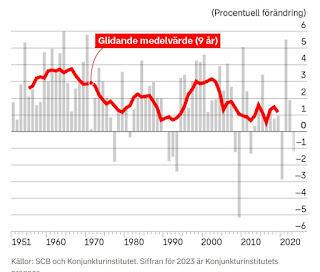Grundbultsfrågan Hur blir S = I
Grundbultsfrågan: Hur blir S = I ??? Savings and investment, being different activities carried on by different people Man återkommer ständigt till Keynes och Hayek. Har den ekonomiska "vetenskapen" inte kommit längre? Rolf Englund blog 8 juli 2014 Själv brukar jag med en dåres envishet upprepa följande ord, första gången den 5 december 2009 Jag tycker det är skriande uppenbart att räntan världen över är för låg och att en större del av stimulanserna borde ske via finanspolitiken. https://www.internetional.se/stabiliseringspolitik.htm Copilot skriver: The idea that savings and investment must be equal is a fundamental concept in macroeconomics. This principle is rooted in the national income accounting identity, which states that in a closed economy (one without international trade), the total amount of savings must equal the total amount of investment. Here's a simplified explanation: - **Savings**: When individuals or businesses save money, they are essentially set...





